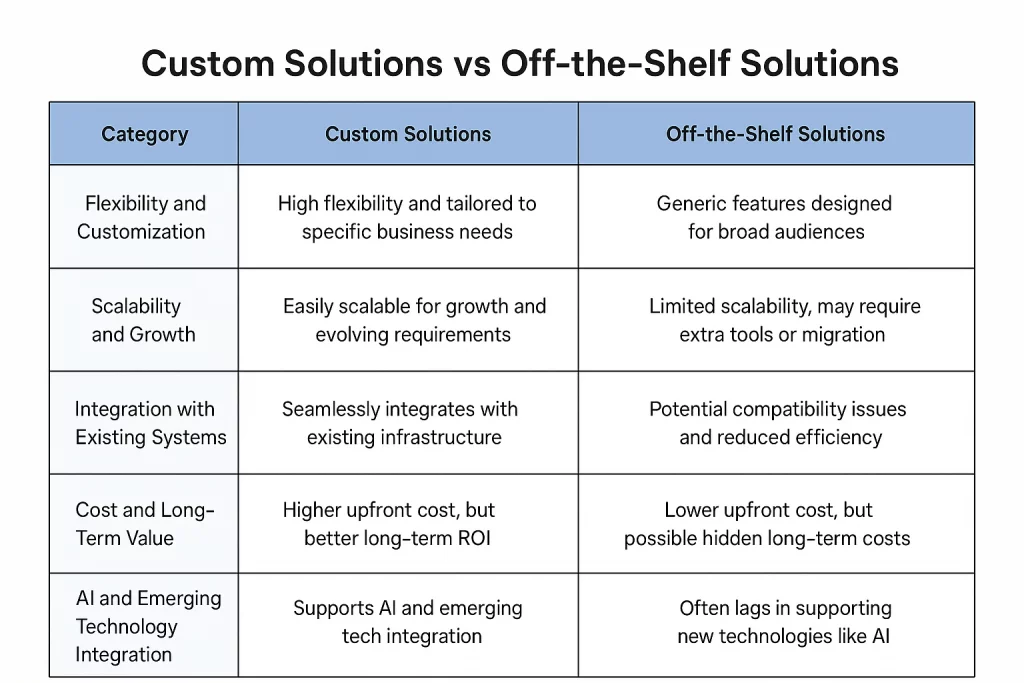Table of Contents
Listen to article
Manual errors affecting productivity, limited ability to personalize customer interactions, and difficulty managing workflows across teams or departments—these are just some of the key drivers behind business process inefficiencies in today’s competitive market.
With 62% of organizations struggling to optimize tasks through business process management, it’s clear that companies need to adopt advanced solutions to overcome longstanding challenges.
For that reason, an increasing number of companies are turning to custom application development—so much so that the global custom software development market size is expected to grow at a CAGR of 22.6% from 2025 to 2030. Why?
Because it’s evident that custom application development services are the key to streamlining operations, enhancing system integration, and adapting to evolving business needs.
Dive into the world of custom app development with us, where we’ll discuss the benefits of custom solutions, how they compare to off-the-shelf software, and more.
What Is Custom Application Development?
Custom application development is the process of designing, developing, and deploying software applications tailored to meet specific business needs and workflows. It helps you work smarter by automating tasks, connecting systems, and giving you full control over features and functionality. With a custom solution, you gain greater efficiency, flexibility, and the ability to scale without limits—advantages that off-the-shelf solutions often fail to provide.
Types of Custom Applications
What do we mean when we say “custom applications”? What does this entail?
There are different types of applications that can be developed, including:
Software Application Development
Software application development refers to the creation of applications across a variety of platforms, including desktops, mobile devices, and web browsers.
Think of software development as an umbrella term that encompasses various types of development. Just as soccer is a type of sport, web applications, mobile applications, desktop software, and others are all categories that fall under the broader field of software development.
Web Application Development
Custom web application development refers to the creation of tailored web-based applications, with technologies like HTML, CSS, and JavaScript playing an important role in the development process. In other words, these solutions are designed to run in a web browser and are accessible across devices with an internet connection.
Enterprise Application Development
Enterprise application development is the process of building and deploying complex software systems tailored to meet the specific needs of large organizations. Custom application developers design these systems to overcome unique business challenges, automate processes, and enhance efficiency.
Mobile Application Development
As the name suggests, mobile applications are designed to run on mobile devices like smartphones, tablets, and digital assistants. With more mobile subscriptions than people on the planet—yep, you heard that right—mobile app development is key to helping businesses stay competitive in today’s technology-driven world.
Custom Application Development vs. Off-the-Shelf Solutions
While a custom solution is tailor-made to meet the specific requirements of a company, an off-the-shelf solution is a pre-built software product designed for mass use.
When choosing between these two options, there is no “right” or “wrong” choice—the decision between custom solutions and off-the-shelf systems ultimately depends on your organization’s unique needs, goals, and resources.
That said, it’s important to understand the differences between these two options to make a more informed decision.

Flexibility and Customization
One of the advantages of creating a custom app for business is that it provides a level of flexibility and customization that off-the-shelf solutions can’t match. While custom applications are designed specifically for your business—with the features and capabilities that you require—mass-produced applications typically have generic features that may not meet your specific needs.
Scalability and Growth
Custom software can be easily scaled as your business grows, allowing it to accommodate new requirements, expanded functionalities, and an increasing user base. When you opt for a custom solution, developers will use advanced backend technologies and strategies to ensure the system can handle growth, making it great for businesses that require long-term flexibility.
Off-the-shelf solutions may not scale to the extent that your business requires, meaning you may need to invest in additional tools or even migrate to a new system as your needs evolve.
Integration with Existing Systems
The custom software development process ensures that applications are built to integrate with existing infrastructure. This means that existing workflows and applications won’t be disrupted but rather enhanced by custom solutions.
This isn’t always the case with off-the-shelf systems, which are designed for a broad audience and can often lead to compatibility issues, higher costs, and reduced operational efficiency.
Cost and Long-Term Value
Custom business application development involves higher upfront costs, with the overall price depending on the project’s complexity and specific design requirements. However, custom solutions offer long-term value—not only through increased efficiency, scalability, and ROI, but also by giving you full ownership of the code. This can significantly reduce or eliminate ongoing subscription costs, which often increase over time with off-the-shelf providers.
Off-the-shelf applications, while more affordable initially, may come with hidden long-term costs due to maintenance, limited scalability, and compatibility issues. Additionally, they often lead to vendor lock-in. If pricing changes or the solution no longer fits your needs, migrating to a new platform can be costly and complex—making flexibility and control major factors to consider in your decision.
AI and Emerging Technology Integration
It seems that every day, new technologies are being integrated into business processes. While AI business solutions offer great advantages to businesses, many off-the-shelf applications can’t keep up with the evolving AI market, as they often lack the flexibility, speed, and customization needed to support emerging tools and innovations.
Custom solutions, though, leverage the most advanced technologies and techniques to ensure you stay competitive in the business landscape. If you build an application from scratch and want to add a new feature later on, your development team can easily integrate it without disrupting existing functionality.

How Custom App Development Can Improve and Streamline Your Business Processes
So why should your business develop a custom application?
Keep reading to explore the benefits of using custom software application development:
1. Automation of Repetitive Tasks
Raise your hand if you’ve ever felt frustrated by time-consuming, repetitive tasks.
You’re not alone—most, if not all, businesses face this challenge on a daily basis. To address this challenge, custom apps for your business help automate seemingly never-ending tasks, thereby increasing efficiency and enhancing productivity.
For instance, manufacturing companies can use custom applications to automate production planning, inventory management, and quality control processes.
2. Real-Time Collaboration
Custom applications offer real-time collaboration capabilities, allowing teams to connect instantly, share feedback, and make decisions faster—an increasingly important functionality in a world where remote work is on the rise.
With features like instant messaging, discussion boards, and file sharing, custom application development can help your company break down communication barriers and accelerate project timelines.
For example, marketing teams can leverage custom applications to edit campaigns in real time, track live performance metrics, and streamline approval workflows.
3. Improve Data Accuracy
Custom applications can integrate tailored data management solutions to automate data cleansing, support customizable data fields, and implement real-time analytics—helping companies uncover trends and patterns with live insights.
In addition to improving data quality, custom application developers help minimize the risks associated with data inconsistencies, such as financial losses, poor decision-making, and damaged customer relationships.
For example, financial teams can use custom applications to validate data in real time, monitor live financial metrics, and automate reporting workflows to ensure greater accuracy.
4. Centralized Data Management
Imagine you could collect, store, and manage all your business’ data in one location—sounds ideal, right?
Custom applications do just that. Developers design the application’s architecture to consolidate data from various sources into a single, controlled repository, thereby enhancing data consistency, strengthening security, and supporting more informed decision-making.
Consider the healthcare industry, for example. With custom applications enabling centralized data, providers benefit from improved data visibility—allowing them to consolidate patient records, streamline data entry across departments, and access critical information in real time.
5. Improve Customer Experience (CX)
71% of consumers expect companies to deliver personalized interactions. This means that creating a custom app for your business is more important than ever. Why?
Because custom applications are designed to meet the unique needs of their target audience, with user interfaces, features, and workflows created to align with specific user expectations. When combined with AI, these apps can take personalization even further by analyzing user behavior, adapting content in real time, and delivering smarter, more engaging experiences.
For example, educators can use AI-powered custom applications to deliver personalized learning experiences, offer interactive content based on individual progress, and provide real-time feedback.
Pros and Cons of Using Custom Application Development for Your Business
The purpose of this article is to tell you everything you need to know about custom business application development, so we won’t beat around the bush—here are the pros and cons that every company should know before investing in a custom solution.
Pros
The pros of custom application development include:
- Tailored to Specific Business Needs: Custom solutions are tailored to meet the exact needs of your business—taking into account your target audience’s expectations, industry-specific requirements, and unique operational goals—ensuring that your solution supports growth, efficiency, and lasting success.
- Enhanced Customer Experience: Deliver personalized interactions and faster service that align with your users’ expectations.
- Competitive Advantage: By offering unique features and functionalities, custom solutions help your company stand out in a competitive business landscape, thereby supporting continuous growth.
- Stronger Security and Compliance: Built to meet industry-specific standards, custom applications help protect sensitive data and ensure regulatory compliance.
- Scalability and Flexibility: As mentioned, custom solutions are built to scale, meaning your system can handle growing business needs without sacrificing quality.
- Smarter Decision-Making: With real-time data visibility tailored to your operations, you can make faster, more informed decisions.
- Better Return on Investment (ROI): By creating a solution that addresses your specific business needs, you can reduce unnecessary spending on unused features, streamline operations, and maximize efficiency, leading to higher returns over time.
- Efficiency Gains: Custom applications streamline key workflows, eliminating bottlenecks and reducing manual tasks to boost overall productivity.
- Seamless Integration: Custom solutions connect with your existing tools and systems, supporting a unified and efficient tech ecosystem.
- Full Ownership and Control: You own the code, avoiding vendor lock-in and long-term subscription costs that can increase over time.
Cons
The cons of custom application development include:
- Higher Upfront Investment: Because development is tailored to your specific needs—not based on templates—custom solutions require a larger initial investment.
- Time to Deliver: Custom development requires time; companies must be ready to invest in a longer planning and development cycle before experiencing the benefits of a fully functional solution.
- Ongoing Maintenance: With custom solutions, maintenance becomes your responsibility—so it’s important to plan for long-term support and updates.
- Technical Proficiency: Custom app development requires a high level of technical expertise, meaning companies may need to hire experienced developers or partner with a skilled software development company.
Why You Should Consider Scopic as Your Custom Application Development Partner
At Scopic, we’re committed to creating custom applications tailored to the unique needs of each business. With nearly 20 years of experience in software development, we’ve helped companies across various industries build innovative solutions that set them apart from the competition.
We also understand the importance of integrating advanced technologies into our solutions. By putting AI at the forefront of our development processes, we help companies automate tasks, increase efficiency, and create personalized customer experiences.
Our work with Codeaid is a great example of our commitment to innovation.
The founders of Codeaid had a clear vision: to create a solution that tackles the challenges of hiring in the development sector. They partnered with our team to build the AI Interviewer tool—a Git-based testing system that simulates real-world coding environments.
Leveraging natural language processing and machine learning, we implemented AI-driven features such as skill-based question generation, CV insights, candidate-centric interviews, and real-time performance evaluation.
The result was an AI-powered application that boosted recruitment efficiency and ensured high-quality candidate assessment.
To see more of our custom applications, we invite you to explore our extensive portfolio.
Conclusion
Custom application development helps companies effectively reach—and impress—their target audience. Compared to off-the-shelf solutions, custom applications are more secure, scalable, and tailored, making them an ideal choice for companies across various industries.
At Scopic, we just so happen to specialize in crafting custom solutions. Whether you need a web application development services, mobile platform, or an advanced AI tool, we’re your dedicated partner for all things development.
If you’re interested in custom business application development, contact us today.

About Custom Application Development Guide
This guide was authored by Baily Ramsey, and reviewed by Enedia Oshafi, Engineering Operations Manager at Scopic.
Scopic provides quality and informative content, powered by our deep-rooted expertise in software development. Our team of content writers and experts have great knowledge in the latest software technologies, allowing them to break down even the most complex topics in the field. They also know how to tackle topics from a wide range of industries, capture their essence, and deliver valuable content across all digital platforms.
Note: This blog’s images are sourced from Freepik.





